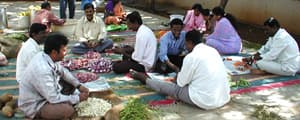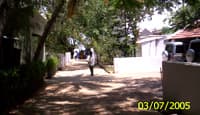Intervention Strategy
9 Year Intervention
ADATS followed a 9 year Intervention Strategy to build the Coolie Sangha. Activities were divided into three distinct 3-year phases of Formation, Formalisation and Consolidation, with Staff pull out at the end of each Phase. Material and non-material inputs were introduced and cut-off at definite points of time in this 9 year matrix in order to achieve maximum impact.
After 9 years ADATS withdrew from mundane day-to-day responsibilities and related to the mature and independent Coolie Sangha Units in a totally different manner, performing an altered role. Role transformation would be a more accurate term than withdrawal.
The ADATS/Coolie Sangha Organogram clearly traced the lines of reporting and control between the 2 Organisations, elucidating tasks, positions, responsibilities and reporting procedures of various Staff and elected village Functionaries.
Specially designed management aids were put into use in an attempt to make the entire operation simple, transparent and efficient.
The ADATS/Coolie Sangha Intranet is designed to capture raw data, convert it into information, and meet the diverse day-to-day information needs of Staff and Functionaries, enabling them to monitor development Processes and measure Results. InfoNeeds is a part of the digitization effort at ADATS and the Coolie Sangha, aimed at increasing efficiency by making decision making totally transparent and devolving all powers to tax paying Member Coolie families.
Proven material for achieving targets were packaged into training and campaign material, books, charts, audio cassettes, examination schedules, et al. Procedures were laid down for obtaining CSU and Cluster recommendations before extending assistance. Systems were put in place to facilitate grassroots planning and CSU monitoring of economic activities like the CCFs and DLDP. From 2004, annual Effects Monitoring exercises were conducted in each and every Cluster where elected functionaries and ADATS Field staff together pored through indicators and measured progress.
To this date, weekly Cluster Meets act as "Formal Points of Working Contact" between ADATS Staff and Coolie Sangha Functionaries. Monthly Taluk Coolie Sangha Meetings recommend/endorse policy and programme choices and ratify budget allocations to village CSUs. Annual Reviews are conducted by the Coolies themselves. ADATS does not relate to Coolie families directly. Our beneficiaries are, in this sense, the village CSUs and not thousands of Coolies in an individual or personal capacity.
Implementation Technology
An Implementation Technology is not the same as an Intervention Strategy. It cannot be understood as just a series of tested actions to perform or proven packages to deliver in a particular manner, following a certain sequence, and within a defined time framework. It has to be understood within a contextual framework wherein such actions, packages, sequences and time frames exist. This contextual framework demands clarity on the macro factors influencing the problem as well as a detailed micro analysis of the specificity of the locale, an ideological choice to contribute with a definite bias towards a particular caste-class, a determined commitment to achieve results, along with the actual technology which spells out what has to be done, why, how and when.
An Implementation Technology demands transparency. No objective or technique can afford to be elusive and no hidden agenda can be harboured. The Coolies have to be very sure as to what the effort is aimed at as well as the development worker's personal motivation for making it.
An Implementation Technology thereby demands, as a pre-condition, a deep and shared concern that zest commitment at every level in the Staff as well as in the Coolies and creates a healthy work ethos of participation — the full sharing of credit and achievement even though each contributes only a small or large bit, theoretical or practical, to the total effort.
An Implementation Technology is, in a word, a state of the art. A management system which cannot survive outside the management milieu; a set of tools, techniques and sequences that will not produce results without the theoretical clarity, ideological choices, mental conditioning, and the human and physical infrastructure to support it.
Organisation Culture
ADATS believes that a parity has to be found between the personal and the political. The way we development workers live and work has a direct bearing on what we turn out. Over the years, we have tried to evolve a woman-friendly environment which goes beyond making women colleagues feel comfortable. It makes living and working a pleasure and enhances everyone's overall performance.
Salary scales at ADATS are reasonable. Perks include a standard and uniform accommodation, medical benefits at general wards in government and church run hospitals, children's education at local village schools where tuition does not exceed ₹ 35 per month, and subsidised mess facilities for those who find it inconvenient to cook. These are identical for all Staff members, whatever be their designation.
The total administration costs at ADATS are consciously restricted to under 5%. Everyone is encouraged to be totally open about personal finances and no Staff member is permitted to undertake any business, with the single exception of family cultivation. No attempt has been made to build an individual security for Staff members. The value of living on the knife edge of insecurity is consciously promoted as an instrument to ensure relevance and efficiency.
Wherever possible we try to build a campus for living apart, yet together. This provides a moral and physical security and permits the sharing of common facilities.
 New forms of getting together where all the family members can participate are encouraged. Festivals are celebrated collectively without any overt religious trappings.
New forms of getting together where all the family members can participate are encouraged. Festivals are celebrated collectively without any overt religious trappings.We give a lot of room for sharing emotions without at the same time getting submerged in destructive self-pity. We support our colleagues when they want to marry inter-caste or inter-religion, even at the risk of personal endangerment. We wait till the last motorcycle comes in from the field before shutting the gates and going to sleep.
Office timings are flexible and determined by the Staff-teams themselves. We have no fixed holidays and each Staff works out when they want to take time off in a responsible manner that does not affect their work or inconvenience others. Mothers bring infants to work and everyone pitches in to change diapers. Motorcycle usage is not strictly monitored since it is recognised that going home to one's village is a natural and necessary part of working. But the use of 4 wheelers is strictly logged.
Though we try not to departmentalise the Staff into Accounts Admn, Field and Executive Wings, work load, specialisation, overall responsibilities and the chasing of near impossible targets do tend to compartmentalise our interests and participation.
There are no in-camera meetings or official secrets, be they financial matters, dealings with partners, or whatever. Books of accounts, statements, transaction details, and correspondence files are available to everyone. No one is made to feel left out. The every Monday "Situation Meetings" are exactly what the name suggests. They are designed to give everyone a sense of bearing and identity within the overall effort. Unless the situation so demands and everyone is interested in a particular aspect of project implementation they are normally not monitoring meetings.
An important consequence of this campus lifestyle is that it alters child care practices. Children are not considered a burden and no one has to overtly worry about looking after "their" children, since they belong to everyone. This gives a lot of scope for the children themselves, with a whole lot of adults taking interest in their welfare and development.

New persons are invited to join us on a trial period which lasts for 1-3 months. During this time, we mutually decide not just where her contribution will be, but also whether she will fit into and contribute to the overall organisational culture. ADATS has excellent relations with ex-Staff who leave us for a variety of reasons. We deal with them on the same terms as when they were with us, and genuinely consider them a human capital that we can bank upon.
These things work only when they are not abused. If someone starts continually offloading their emotional baggage and private frustrations without making serious efforts to get a grip and move on, then the situation becomes insufferable. If the openness and freedom are misused to take too much time off, other people's work burden increases unfairly and the job gets left undone.
An ironic paradox in ADATS — as different from the Coolie Sangha — is that democratic instruments are not used to settle organisational problems. Instead the project leadership at each campus takes tough decisions to solve problems. This does not mean that discussions are disallowed or that project leaders run rough shod over the rest. There are enough checks and balances in the system to spot this tendency at an early stage.
2-Organisations Policy
ADATS follows a 2-Organisations Policy wherein the NGO (ADATS) and the people's organisation (Coolie Sangha) are kept as separate and distinct bodies, each with its own identity, priorities, role and responsibility. While it is true that ADATS is the parent of the Coolie Sangha, great care is taken to ensure that a patronising attitude is not developed.
The ADATS Governing Body has abdicated all rights to itself form policies or make program choices without the active participation and positive recommendation of the Coolie Sangha.
While ADATS has a definite role during the 3 phases of Coolie Sangha building, its role as a support NGDO transforms to another after withdrawal. ADATS' main role in the post-withdrawal phase is to plug in the Coolie Sangha to the outside world — i.e. to articulate what is happening within the Coolie Sangha to other actors, and to explain what is happening in the outside world to the Coolie Sangha.
We realise that strong personal and emotional links would have, in the meantime, got developed between ADATS Staff (development workers) and Member Coolie families. These bonds will continue. They are not unhealthy. Provided patronising rote roles that promote a one-sided dependence are not perpetuated.
Post Intervention Role
From 2013 to 2017, we underwent a self-critical exercise to ponder on a role transformation for ADATS.
44 years back, ADATS described the political economy of the day, and it served us well to plan appropriate responses. The time had come to develop a new theory that explains today's happenings; one that finds resonance in the people we work with.
We concluded that the post-project implementation role that ADATS needs to set for itself is to create institutional capital from the social capital that has been built in the Coolie Sangha and generate employment opportunities for the rural poor to participate in locally owned and operated decentralised ventures within a new age economy.
Please see our paper on Institutional Support to the Coolie Sangha.
